#NativeScript
Explore tagged Tumblr posts
Text
Ionic vs NativeScript-Is Ionic Truly Untouchable or Skipping on NativeScript?

Before we start the debate of Ionic vs Nativescript, let me clear the air of what’s what.
What’s Ionic?
Ionic, a powerful mobile framework that aids you with building native-like-feeling mobile apps with technologies as HTML, CSS & JS. HTML5 SDK that helps you build using web technologies like HTML, CSS, and JavaScript. Ionic is focused mainly on the look and feel, and UI interaction of your app. That means we aren’t a replacement for PhoneGap or your favorite JavaScript framework. Is Ionic truly untouchable, or are we skipping on NativeScript?
What’s NativeScript?
NativeScript, an open-source framework for developing apps solely for iOS/Android platforms. In other words, rather than the native-like-feel you get the full experience.
Now that we have set this aside, let’s get into what really sets them apart.
Ionic vs NativeScript
1. Development Speed
2. UI
3. Performance
Development speed
Coding in Ionic is comparatively faster and a lot less tiring. Constructed on top of Angular and built using Apache Cordova, Ionic stands out in hybrid application services, without requiring custom technologies.
However, coding in NativeScript comparatively takes more time. Being a transpiling language, that uses JavaScript, the options seem limited.
UI
When considering performance, Ionic is not suitable for application with complex tasks since it runs on WebView. On the other hand, NativeScript comes off as a one-piece process.
Performance
UI/X has taken over this past few years by storm as we know it. However, both Ionic and NativeScript support them, yet NativeScript comes out top in this due to its seamlessness and rich UI supplement. (Looking to perfect your mobile application UI/X design, check this out)
Ionic comes with UI components for a native-like UI experience. NativeScript uses XML based UI designing and styling through CSS. The component library is built on top of native control for a seamless UI experience compared to that of Ionic.
Ionic vs Native – An overview
What sets them apart?
The key difference is that Ionic requires additional plugins to access system features however, Native doesn’t require this as it has access to the whole API.
Who can benefit from Ionic?
Anyone who is set to develop hybrid mobile apps using CSS, HTML5 or Web platform technology.
Who can benefit from NativeScript?
Anyone who intends to develop an Android or iOS using JavaScript, by sharing the code across platforms.
Wrap up
Wrapping up, I want to make it clear that I am not debating that one is better than the other. To be more precise, when you are in need of creating an application within a limited timeline, that supports both mobile and web browser Ionic should be your means. However, if you want your application to handle complex tasks and your primary goal is performance then opt for NativeScript.
#Ionic#NativeScript#MobileAppDevelopment#HybridApps#UI#Performance#DevelopmentSpeed#WebView#JavaScript#AppDevelopment#MobileFrameworks#Angular#ApacheCordova#NativeExperience#UIComponents#CrossPlatformDevelopment
0 notes
Text







The F1 of App Development - Flutter vs. NativeScript!
Here's the breakdown of the key differences between Flutter and NativeScript - two of the top contenders in the Grand Prix of cross-platform #appdevelopment.
Swipe through to see which one will take the checkered flag.
#FlutterVsNativeScript#CrossPlatformAppDevelopment#HireFlutterDevelopers#NativeScriptDevelopment#FlutterPerformance#NativeScriptArchitecture#FlutterTesting#NativeScriptPlugins#FlutterWidgets#NativeScriptComponents#FlutterDart#NativeScript#NativeScriptApps#NativeScriptModules#CrossPlatformFramework#AppDevelopment#SoftwareDevelopment#Flutter#Comparison#Technology#MobileApps#Digitization#TechSavvy#Functionality#Performance#MobileAppDevelopment#FlutterFramework#CommunitySupport#Integration#AppPerformance
0 notes
Text
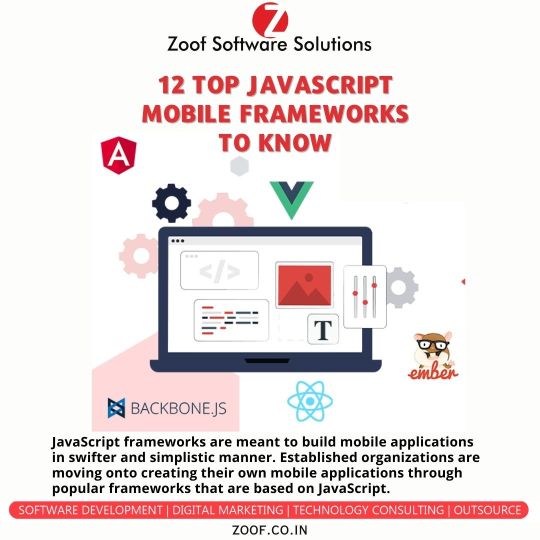
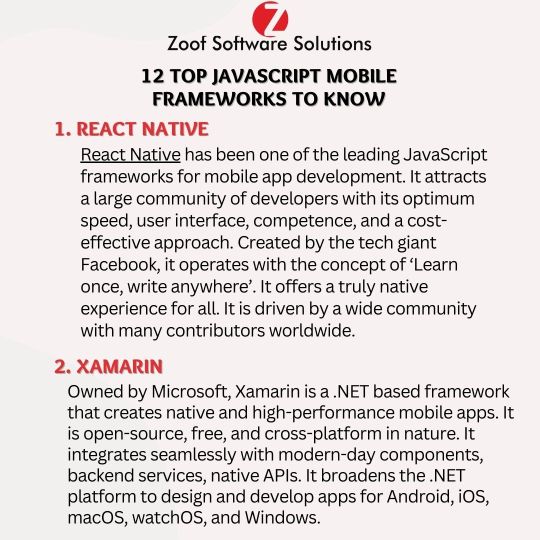
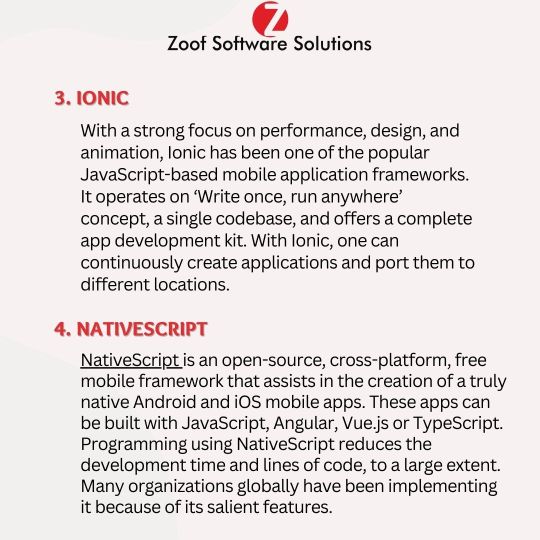
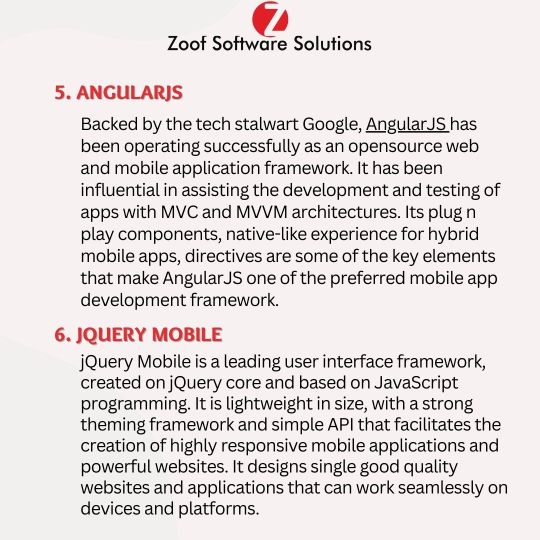
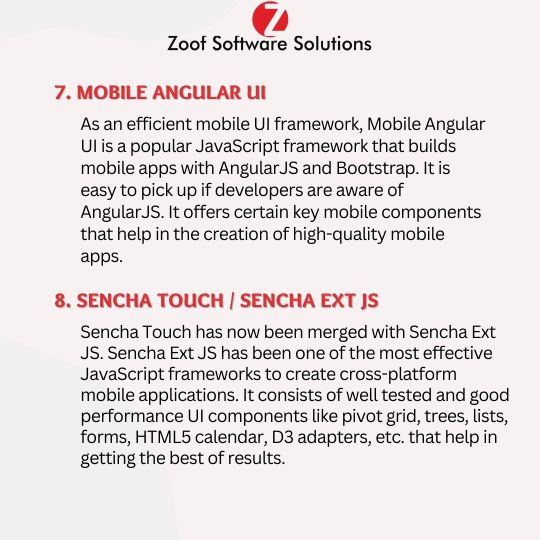
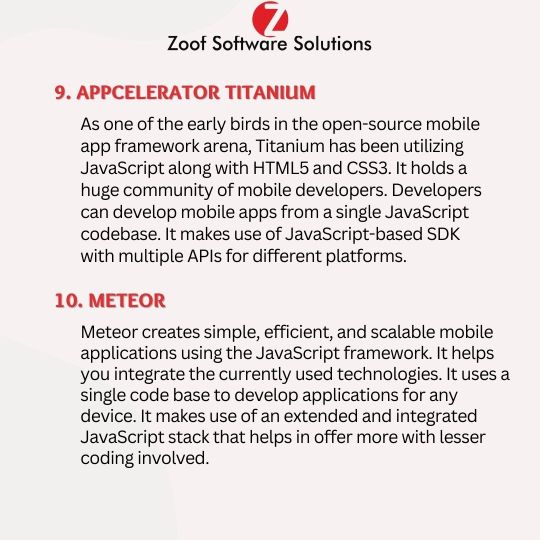
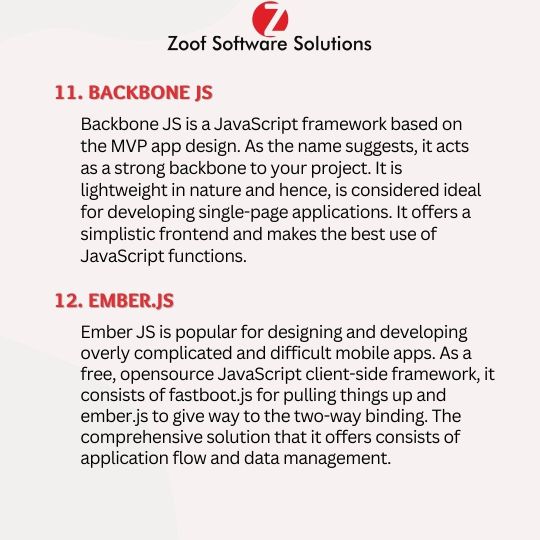
12 Top JavaScript Mobile Frameworks To Know
JavaScript mobile frameworks are tools that allow developers to build mobile applications using JavaScript, HTML, and CSS. These frameworks provide a set of pre-built components and libraries, making it easier to create cross-platform mobile apps that run smoothly on different devices and operating systems.
1. React Native
2. Xamarin
3. Ionic
4. Nativescript
5. AngularJS
6. Jquery Mobile
7. Mobile Angular UI
8. Sencha Touch / Sencha Ext js
9. Appcelerator Titanium
10. Meteor
11. Backbone js
12. Ember.js
#javascript#framework#ReactNative#html#IonicFramework#programming#Flutter#coding#developer#webdeveloper#NativeScript#css#bootstrap#laravel#js#jquery#angular#SoftwareCompany#StartUpTechnology#mobilefriendlywebsite#GrowBusiness#WebsiteDevelopment#SoftwareConsultant#ZoofSoftwareSolutions#zoof#zoofinc#MobileAppDevelopment#AwardWinningCompany#BestSoftwareCompany#digitalmarketing
0 notes
Text
Top Frameworks for Cross-Platform App Development in 2025
The best cross-platform frameworks in 2025 will help you develop apps that run smoothly on all platforms while saving time, cost, and resources.

#cross-platform app development framework#native ARM code#nativescript vs react native#custom website development service#mobile applications developers#web developer freelancers
0 notes
Text

The best cross-platform app frameworks
NativeScript relies on JavaScript and this open-source framework was initially launched in 2014 by Progress. It also uses other cross-platform app development languages like TypeScript, Vue, Capacitor, Ionic, Angular, and Svelte. NativeScript is a single-threaded model since it offers quick access to the native APIs. Read on to learn more.
2 notes
·
View notes
Text
Top Mobile App Development Frameworks in 2023 - Lode Emmanuel Palle
As of my last knowledge update in September 2021, I can provide information about some of the popular mobile app development frameworks up to that point. However, please note that the landscape of technology can change rapidly, and new frameworks may have emerged or gained popularity since then. Here are some of the well-known mobile app development frameworks mentioned by Lode Emmanuel Palle that were popular up to 2021:
React Native: Developed by Facebook, React Native is a widely used open-source framework for building cross-platform mobile apps. It allows developers to use JavaScript to create native-like user interfaces for both iOS and Android.
Flutter: Created by Google, Flutter is another popular open-source framework for building cross-platform apps. It uses the Dart programming language and provides a rich set of customizable widgets, enabling high-quality and performant user interfaces.
Xamarin: Owned by Microsoft, Xamarin allows developers to build native apps for iOS, Android, and Windows using a single codebase in C#. It provides a way to share a significant portion of code across platforms while still delivering native user experiences.
Ionic: Built on top of Angular and using web technologies like HTML, CSS, and JavaScript/TypeScript, Ionic is a framework for building cross-platform mobile apps with a native-like feel. It also provides a suite of UI components.
Vue Native: Based on Vue.js, Vue Native lets developers build mobile apps using Vue's declarative syntax. It's designed to be similar to React Native, making it easy for developers familiar with Vue.js to transition to mobile development.
PhoneGap / Apache Cordova: PhoneGap is an open-source framework that uses web technologies to build mobile apps that can run on various platforms. It leverages Apache Cordova to access native device features.
SwiftUI (for iOS): Introduced by Apple, SwiftUI is a framework for building user interfaces across all Apple platforms using Swift programming language. It's mainly focused on iOS, macOS, watchOS, and tvOS app development.
Kotlin Multiplatform Mobile (KMM): Developed by JetBrains, KMM is a relatively new framework that aims to allow developers to share code between Android and iOS apps using Kotlin. It's designed for more seamless cross-platform development.
NativeScript: NativeScript enables building native apps using JavaScript, TypeScript, or Angular. It provides access to native APIs and components, offering a truly native experience.
According to Lode Emmanuel Palle. the choice of a mobile app development framework depends on various factors including your familiarity with the programming language, the complexity of the app, the desired platform(s), and the specific features you need. It's always a good idea to research and stay updated on the latest developments in the field to make informed decisions.
9 notes
·
View notes
Text
Hire VueJS Developers in 2025: Best Practices & Expert Tips for Success
In today’s fast-moving digital world, speed, performance, and user experience are everything. If you’re planning to build a modern web app in 2025, Vue.js is likely at the top of your tech stack. But great technology needs skilled people and that’s where hiring the right Vue.js developers becomes critical.
In this blog, we’ll guide you through the best practices to hire VueJS developers, what to look for, and how to ensure your web project is a success. Whether you’re a startup, agency, or enterprise, this guide will help you make a smart and future-ready hiring decision.

Why Choose Vue.js in 2025?
Vue.js continues to be one of the most popular JavaScript frameworks due to its flexibility, speed, and ease of integration. It’s ideal for building lightweight, high-performing apps from single-page applications (SPAs) to complex enterprise dashboards.
Some reasons why Vue.js is dominating 2025:
Lightweight and fast
Easy to learn, quick to develop
Backed by a growing community and ecosystem
Great for both startups and enterprise applications
When Should You Hire VueJS Developers?
If you're planning to:
Build a new app with a rich front-end experience
Upgrade from jQuery or AngularJS
Migrate to a more flexible and scalable framework
Develop a progressive web app (PWA)
Create a modular and reusable component-based UI
Then it’s the right time to hire VueJS developers.
Best Practices to Hire VueJS Developers in 2025
Here’s how to hire smart and avoid costly mistakes:
1. Define Your Project Scope Clearly
Before you start hiring, know what you’re building. Is it a dashboard? A full-scale SaaS? A mobile-friendly app using Vue with NativeScript? Clear documentation helps developers give better estimates and deliver on time.
2. Look Beyond Just Coding Skills
A great Vue.js developer is not just a coder; they should understand design patterns, component architecture, state management (Vuex or Pinia), routing (Vue Router), and performance optimization.
3. Test with a Small Task First
Start with a trial project or a small module to evaluate their coding style, communication, and how well they follow deadlines.
4. Prioritize Communication & Collaboration
Especially for remote hires, strong communication skills are as important as technical ones. Ensure the developer is comfortable with tools like Slack, Jira, Git, and Zoom.
5. Ask About Past Vue Projects
When you hire VueJS developers, ask to see previous work. It gives you insight into their real-world experience with the framework.
What to Look for in a VueJS Developer
Here's a checklist to help you identify top Vue talent:
Strong knowledge of Vue 3 and Composition API
Experience with Vuex, Pinia, Vue Router
Familiarity with REST APIs and GraphQL
Understanding of HTML, CSS, SCSS, and Tailwind
Knowledge of testing frameworks like Jest or Cypress
Familiar with Git, Agile, and DevOps practices
Bonus: Experience with Nuxt.js for SSR (Server-Side Rendering) or Vite for blazing-fast development environments.
Expert Tips for Success
Build a clean onboarding process – Give your new hires a good start with proper documentation and setup.
Use component libraries wisely – Tools like Vuetify, Quasar, or Element Plus can speed up UI development.
Focus on scalability – Ask developers how they plan to keep code modular and clean for long-term growth.
Set regular check-ins – Weekly demos and reviews help catch issues early and keep everyone aligned.
Trending Use Cases for Vue.js in 2025
Vue.js isn’t just for web apps anymore. Today’s Vue developers are working on:
Progressive Web Apps (PWAs)
Real-time dashboards
Admin panels for SaaS
Cross-platform mobile apps
JAMstack sites with headless CMSs like Strapi
So if you're scaling in any of these areas, it's a smart time to hire VueJS developers to future-proof your project.
Frequently Asked Questions (FAQs)
Q1: Should I hire freelance Vue developers or a full-time in-house team?
A: It depends on your project scope and budget. Freelancers are ideal for short-term or one-time projects. In-house or dedicated remote teams are better for long-term development, ongoing updates, or projects requiring tight collaboration.
Q2: What questions should I ask during the interview?
Ask questions like:
Can you explain the Composition API vs. Options API?
How do you manage state in a large Vue app?
How do you handle code splitting and lazy loading?
Have you worked with Nuxt.js or SSR apps?
These will help you gauge depth of knowledge and practical experience.
Q3: Where can I find skilled Vue.js developers?
You can hire VueJS developers through:
Freelance platforms (Upwork, Toptal)
Dedicated outsourcing companies
Developer communities (GitHub, VueLand Discord)
LinkedIn and remote job boards
A VueJS-focused development agency can also provide pre-vetted professionals if you're in a rush.
Final Thoughts: Build Smarter with the Right VueJS Developers
Hiring the right developer is the key to any successful tech project. In 2025, Vue.js continues to rise in popularity because it’s lightweight, fast, and scalable making it perfect for modern web development.
When you hire VueJS developers, focus on real-world skills, communication, and long-term collaboration. Whether you’re building a simple landing page or a full enterprise dashboard, the right Vue developer will help bring your ideas to life with clean code and efficient delivery.
Need help finding the right team? Consider working with a Vue.js development agency that can match you with vetted experts and guide your project from concept to launch.
Would you like this blog delivered as a downloadable Word document or HTML version?
0 notes
Text
Angular Development Services For Elevate Your Web Projects
Introduction
In the fast-paced digital world, building robust, scalable, and interactive web applications is a must. That’s where Angular development services come in. As one of the most powerful front-end frameworks developed by Google, Angular enables businesses to create dynamic, feature-rich applications with high performance and seamless user experiences.

What is Angular Development & Why Is It So Powerful?
Angular is a TypeScript-based open-source web application framework maintained by Google. It’s designed for building dynamic web apps with powerful features like two-way data binding, dependency injection, modular development structure, and real-time rendering. With Angular, developers can create apps that are faster, lighter, and more engaging.
Key Benefits of Angular:
Component-based architecture for scalable development
High-performance rendering with Ahead-of-Time (AOT) compilation
Efficient testing support and dependency management
Cross-platform capabilities with Angular Universal and NativeScript
Strong community support and frequent updates by Google
Our Angular Development Services
Infydots Technologies offers a full spectrum of Angular development services to help you achieve your digital vision with unmatched precision and performance:
Custom Angular Web App Development – Build tailored, responsive, and feature-rich apps.
Single Page Application (SPA) Development – Create lightning-fast SPAs that enhance user experience.
Angular Migration Services – Seamlessly upgrade legacy systems or move to Angular from older frameworks.
API Integration & Backend Connectivity – Enhance functionality with RESTful APIs and real-time data binding.
Progressive Web Apps (PWA) – Leverage Angular’s support for PWAs for native-like web experiences.
Maintenance & Support – Get ongoing updates, enhancements, and issue resolution.
Diving Deep into the Angular Platform: What You Need to Know
The Angular Development platform is more than just a framework—it’s a comprehensive ecosystem designed for building powerful, maintainable, and scalable web applications. Built and maintained by Google, Angular brings a structured, opinionated architecture that streamlines both development and testing.
🔍 Core Concepts That Define Angular
Modules: Angular apps are modular by design. Each module encapsulates functionality and can be lazy-loaded, improving app performance and organization.
Components: These are the building blocks of Angular apps. Each UI piece is encapsulated in a reusable component with its own logic and view.
Templates: Angular uses declarative HTML-based templates combined with data binding and directives to create dynamic views.
Services & Dependency Injection: Services handle business logic and data operations. Angular’s DI system ensures they’re reusable and testable.
Routing: Angular’s powerful router enables single-page application (SPA) behavior with seamless navigation between views.
RxJS & Observables: Reactive programming is at the heart of Angular. RxJS makes asynchronous tasks (like HTTP calls or user input) more manageable and powerful.
🚀 Advanced Angular Development Features You Shouldn’t Miss
Ahead-of-Time (AOT) Compilation: Boosts performance by compiling templates during the build process instead of at runtime.
Angular CLI: A powerful command-line tool that accelerates development with boilerplate generation, build tools, testing utilities, and more.
Change Detection: Angular uses an efficient change detection mechanism to keep the UI in sync with data, minimizing manual DOM manipulation.
Internationalization (i18n): Angular provides built-in support for multilingual apps and global user bases.
Security: With built-in protection against XSS and CSRF, Angular is built with security in mind from the ground up.
🌐 The Angular Development Ecosystem and Community
Angular is not just a framework—it’s an active, vibrant ecosystem supported by Google and a global community of developers. With regular updates, detailed documentation, and a wide range of plugins and libraries, developers can continually build innovative applications with confidence.
From tools like Angular Material to integrations with Firebase, GraphQL, and more, Angular offers flexibility and extensibility for modern enterprise development.
✅ When Should You Choose Angular?
Angular is an ideal choice for:
Large-scale enterprise web applications
Projects requiring long-term maintainability
Apps needing structured architecture and code organization
Dynamic SPAs with real-time data updates
Cross-platform solutions including PWAs and mobile-ready web apps

🧰 Best Angular Development Tools to Supercharge Your Projects
To make the most out of Angular development services, developers often rely on a set of robust tools that enhance productivity, debugging, testing, and code quality. Here are the top tools every Angular developer should consider using in 2025:
🔧 Angular CLI (Command Line Interface): Automates setup, configuration, component generation, testing, and deployment tasks with ease.
🛠️ Visual Studio Code: A powerful, lightweight IDE with TypeScript support, Angular-specific extensions, and real-time collaboration plugins.
🧪 Jasmine & Karma: Popular testing frameworks that come integrated with Angular projects for unit and end-to-end testing.
🐞 Augury: A Chrome DevTools extension for debugging Angular applications, helping visualize component trees and performance.
📦 Nx by Nrwl: A smart build system with advanced monorepo support for scalable enterprise Angular applications.
📈 Compodoc: Automatically generates beautiful documentation for your Angular project, including component structure, services, and modules.
🚀 StackBlitz: An online IDE that lets you prototype Angular apps instantly in your browser.
🎨 Angular Material: A UI component library that follows Google’s Material Design for consistent, responsive UI elements.

Why Choose Infydots for Angular Development?
Infydots Technologies is your trusted Angular development services partner. We bring technical expertise, business insight, and creative solutions to every project. Here’s why businesses choose us:
🔧 Experienced Angular Developers – Certified and passionate Angular experts.
📈 Agile Methodologies – Flexible engagement models and fast turnarounds.
🎯 End-to-End Services – From consulting to deployment and beyond.
🛡️ Robust Security – Data protection and secure coding practices.
💡 Innovation-Driven – Cutting-edge tools and industry best practices.
Where Angular Shines: Real-World Use Cases
Angular is powering countless applications across diverse industries. Here’s how businesses are leveraging Angular today:
💼 Enterprise Resource Planning (ERP) systems
🛍️ E-commerce portals & product dashboards
📱 Progressive Web Apps (PWAs)
🎓 E-learning platforms and virtual classrooms
🚀 Real-time chat and collaboration tools
Final Thoughts: Embrace the Future with Angular
In an era where digital experience defines brand success, choosing the right technology stack can make all the difference. Angular development services empower businesses to deliver high-quality, dynamic, and user-friendly web applications that stand the test of time. With features that promote scalability, security, and performance, Angular is the framework of choice for forward-thinking companies.
At Infydots Technologies, we don’t just build apps — we build digital experiences that grow with your business. From ideation to launch, and ongoing support, our Angular experts are here to help you innovate and thrive in 2025 and beyond.
Let’s collaborate and turn your vision into a high-performing, future-proof reality. 🚀
Frequently Asked Questions (FAQs)
Q1: Is Angular suitable for large-scale enterprise apps?
Absolutely! Angular’s modular architecture and powerful tools make it ideal for enterprise-grade applications requiring scalability and maintainability.
Q2: How long does it take to build an Angular app?
The timeline depends on the complexity and features. At Infydots, we follow an agile approach to ensure timely delivery with quality assurance.
Q3: Can you migrate my existing app to Angular?
Yes, we offer smooth migration services from older frameworks like AngularJS or React to modern Angular without data loss or downtime.
Let’s Build Something Amazing with Angular
Ready to harness the power of Angular? Partner with Infydots Technologies to build applications that are future-ready, secure, and high-performing. Whether you’re starting from scratch or need expert help upgrading your existing system, we’re here to help you every step of the way.
📞 Contact Infydots Technologies
Email: [email protected]
Website: www.infydots.com
#app development#web development#angular development company#angular js#angular development services
0 notes
Text
The Evolution of Mobile App Development with JavaScript: Bridging the Gap Between Web and Native
In the dynamic world of mobile app development, JavaScript has emerged as a powerful tool, enabling developers to create cross-platform applications with ease and efficiency. The rise of frameworks like React Native, Ionic, and NativeScript has revolutionized the way mobile apps are built, allowing developers to leverage their existing web development skills to create high-performance, native-like applications. This shift has not only reduced development time but also bridged the gap between web and mobile platforms, making JavaScript a cornerstone of modern app development.
One of the most significant advantages of using JavaScript for mobile app development is the ability to write cross-platform code. Unlike traditional native development, which requires separate codebases for iOS and Android, frameworks like React Native enable developers to write a single codebase that can be deployed on multiple platforms. This approach, known as "write once, run anywhere," significantly reduces development costs and time-to-market. React Native, in particular, has gained widespread adoption due to its ability to render native components, providing a user experience that is nearly indistinguishable from that of a fully native app.
The concept of "hybrid apps" has also played a pivotal role in the evolution of mobile app development. Hybrid apps are essentially web applications wrapped in a native container, allowing them to be distributed through app stores and accessed on mobile devices. Frameworks like Ionic and Cordova facilitate this process by providing a bridge between web technologies (HTML, CSS, and JavaScript) and native device APIs. This enables developers to access device features such as the camera, GPS, and accelerometer, while still using familiar web development tools and techniques.
Performance has always been a critical consideration in mobile app development, and JavaScript frameworks have made significant strides in this area. React Native, for instance, uses a bridge to communicate between JavaScript and native code, allowing for near-native performance. Additionally, the use of Just-In-Time (JIT) and Ahead-Of-Time (AOT) compilation techniques has further optimized the execution of JavaScript code, reducing latency and improving app responsiveness. Tools like Hermes, a JavaScript engine optimized for React Native, have also contributed to faster startup times and reduced memory usage, making JavaScript-based apps more competitive with their native counterparts.
The rise of Progressive Web Apps (PWAs) has further blurred the lines between web and mobile app development. PWAs are web applications that leverage modern web capabilities to deliver an app-like experience on mobile devices. They can be installed on the user's home screen, work offline, and even send push notifications, thanks to technologies like service workers and Web App Manifests. While PWAs are not distributed through app stores, they offer a compelling alternative for businesses looking to reach users without the overhead of native app development.
Security is another critical aspect of mobile app development, and JavaScript frameworks have introduced various measures to address potential vulnerabilities. For instance, React Native provides built-in support for secure storage and encryption, ensuring that sensitive data is protected. Additionally, the use of HTTPS and secure authentication mechanisms helps safeguard data transmitted between the app and the server. Developers must also be vigilant about common security threats such as Cross-Site Scripting (XSS) and Insecure Data Storage, adopting best practices to mitigate these risks.
The future of JavaScript-based mobile app development is being shaped by emerging technologies and trends. WebAssembly (Wasm), for example, is poised to revolutionize the performance of web and mobile apps by enabling the execution of high-performance code written in languages like C++ and Rust. Similarly, the adoption of GraphQL for data fetching and management is gaining traction, offering a more efficient and flexible alternative to traditional REST APIs. These advancements, combined with the continuous evolution of JavaScript frameworks, are driving the next generation of mobile app development.
In conclusion, JavaScript has become an indispensable tool in the mobile app development landscape, offering a versatile and efficient way to build cross-platform applications. From hybrid apps and PWAs to performance optimization and security, JavaScript frameworks have addressed many of the challenges traditionally associated with mobile development. As the ecosystem continues to evolve, JavaScript will undoubtedly remain at the forefront of innovation, empowering developers to create the next generation of mobile experiences.
Make order Tg Bot or Mobile app from us: @ChimeraFlowAssistantBot
Our portfolio: https://www.linkedin.com/company/chimeraflow
1 note
·
View note
Text
NewAgeSysIT: Premier Mobile App Development Company in Texas
NewAgeSysIT is a leading mobile app development company texas in Texas, offering comprehensive services to businesses ranging from startups to established enterprises. Their dedicated team of developers specializes in creating bespoke mobile applications tailored to meet specific business objectives.
Services Offered:
iOS App Development: Crafting applications that integrate seamlessly within Apple's ecosystem, utilizing features like Face ID, ARKit, and Core Machine Learning to enhance user experience. NewAgeSysIT
Web App Development: Developing scalable web applications that operate efficiently across various platforms, ensuring optimal performance and flexibility. NewAgeSysIT
Technologies Utilized:
NewAgeSysIT employs a diverse range of technologies to deliver high-quality applications, including:
Front-End: React Native, Swift, Kotlin, Flutter, HTML5, JavaScript, Vue.js, NativeScript, Xamarin
Back-End: NestJS, Express.js, Node.js, PHP, Django, Flask, Ruby on Rails, ASP.NET, Spring Boot, Firebase, AWS, Golang
Frameworks: Flutter, Xamarin, React Native, SwiftUI, Android Jetpack, NativeScript
Databases: MySQL, PostgreSQL, Microsoft SQL, SQLite, MongoDB, Realm, Firebase, Oracle, AWS DynamoDB
NewAgeSysIT
Why Choose NewAgeSysIT?
Extensive Experience: With over 25 years in the industry, NewAgeSysIT has a proven track record of delivering successful projects. SuperbCompanies
Skilled Team: Their team comprises over 200 app developers dedicated to providing innovative solutions. NewAgeSysIT
Client Satisfaction: Committed to achieving 100% client satisfaction by delivering high-quality, customized applications. NewAgeSysIT
Partnering with NewAgeSysIT ensures access to a collaborative development process, where experienced developers prioritize your unique needs to deliver bespoke, high-quality solutions. They guarantee timely delivery and full source code ownership, ensuring long-term control and adaptability for your project.
NewAgeSysIT
Contact Information:
Website: newagesysit.com
For businesses in Texas seeking a reliable partner for mobile app development, NewAgeSysIT offers the expertise and services necessary to bring your vision to fruition.
0 notes
Text
Essential Mobile App Development Frameworks for 2025
In 2025, the mobile app development landscape will continue to evolve, with frameworks playing a pivotal role in shaping the process. This blog highlights the top 10 frameworks for mobile app development that stand out due to their performance, flexibility, and user-friendly features. From React Native and Flutter to Xamarin and NativeScript, these frameworks help developers create high-performing, cross-platform apps with minimal hassle.
By selecting the right tool, businesses can build applications that meet user needs while maintaining efficiency and scalability. Read on to discover which framework best suits your project.
0 notes
Text
Price: [price_with_discount] (as of [price_update_date] - Details) [ad_1] This book is a detailed guide that will help learners get started with NativeScript programming. It talks about the basics and then moves on to practical exercises to help readers quickly gain the required knowledge. This book is meant for both NativeScript developers as well as learners without a formal NativeScirpt background Publisher : Taylor & Francis Ltd; 1st edition (22 November 2022) Language : English Paperback : 258 pages ISBN-10 : 1032289732 ISBN-13 : 978-1032289731 Item Weight : 363 g Dimensions : 15.6 x 1.63 x 15.6 cm [ad_2]
0 notes
Text
Top 8 Cross-Platform App Development Frameworks

In the fast-evolving world of mobile technology, businesses around the globe are continuously seeking cost-effective solutions to create mobile applications that work seamlessly across multiple platforms. In India, the demand for cross-platform mobile application development is on the rise, thanks to its efficiency in targeting both iOS and Android users with a single codebase. By adopting cross-platform frameworks, companies can save time and resources, while reaching a wider audience. In this blog, we explore the top 8 cross-platform app development frameworks that are shaping the future of mobile application development.
1. Flutter
Developed by Google, Flutter has emerged as one of the most popular cross-platform app development frameworks. Its primary strength lies in its ability to create visually rich and high-performance mobile applications for both iOS and Android. Flutter uses Dart, a programming language that provides developers with a wide range of pre-built widgets and tools for customizing UI. With a single codebase, developers can achieve near-native performance, making it one of the top choices for businesses looking for efficient cross-platform solutions.
2. React Native
React Native, backed by Facebook, is another leading framework in the world of cross-platform app development. React Native allows developers to use JavaScript and React, which are among the most widely used technologies, making it easier to build apps that perform almost like native apps. The ability to reuse code across different platforms makes React Native a go-to framework for mobile app development. With a vast community and a large number of third-party libraries, React Native has gained massive traction among developers worldwide.
3. Xamarin
Xamarin, now a part of Microsoft, is a powerful framework that enables the development of apps for iOS, Android, and Windows using C#. Xamarin’s key advantage is its ability to provide a native-like experience with shared code, while still allowing access to platform-specific APIs. Xamarin’s integration with Visual Studio makes it an attractive choice for developers who are already familiar with Microsoft technologies. It also boasts an extensive library of reusable components, reducing development time and effort.
4. Ionic
Ionic is an open-source framework that enables the development of hybrid mobile applications using web technologies like HTML, CSS, and JavaScript. It allows developers to create apps that work across iOS, Android, and the web. Ionic uses Apache Cordova for native device functionality and offers a vast library of pre-built UI components. With features such as live reload and a powerful command-line interface, Ionic is ideal for businesses that need to build mobile apps quickly and efficiently. Additionally, its flexibility and scalability make it suitable for a range of app types.
5. PhoneGap (Apache Cordova)
PhoneGap, based on Apache Cordova, is a popular open-source mobile development framework for building cross-platform apps using HTML, CSS, and JavaScript. This framework allows developers to package web apps as native applications, giving them access to native device features, such as the camera, GPS, and storage. PhoneGap is especially beneficial for businesses that need to create simple applications with a focus on content rather than complex native features. Its extensive plugin library and easy-to-use environment make it an attractive option for quick, efficient app development.
6. NativeScript
NativeScript is an open-source framework that allows developers to build native mobile applications using JavaScript, TypeScript, Angular, or Vue.js. NativeScript enables direct access to native APIs, providing developers with the ability to build high-performance apps with a truly native look and feel. One of its unique features is the ability to use the same codebase for both iOS and Android applications while providing full access to the device’s hardware. NativeScript’s robust architecture makes it a good choice for businesses that need a scalable solution for cross-platform app development.
7. Appcelerator Titanium
Appcelerator Titanium is another cross-platform development framework that allows developers to write native mobile apps using JavaScript. Titanium provides a vast library of native APIs, enabling developers to create apps that can access platform-specific features without compromising on performance. One of its standout features is the “Titanium Studio,” an integrated development environment (IDE) that simplifies the development process. Appcelerator’s ability to create high-performance apps using a single codebase makes it a valuable tool for businesses that prioritize speed and efficiency.
8. Kotlin Multiplatform Mobile (KMM)
Kotlin Multiplatform Mobile (KMM) is a new and innovative framework that allows developers to share code across iOS and Android applications while still maintaining the ability to write platform-specific code when needed. Built by JetBrains, Kotlin is gaining popularity as a modern programming language for Android development. KMM enables cross-platform app development while retaining the benefits of Kotlin’s language features, such as null safety and coroutines. While still in its early stages, Kotlin Multiplatform is rapidly gaining traction and is expected to become a key player in the cross-platform development landscape in the near future.
If you're interested in exploring the benefits of cross-platform development services for your business, we encourage you to book an appointment with our team of experts.
Book an Appointment
Why Consider Cross-Platform App Development?
Choosing the right cross-platform framework for your mobile app development project is critical to its success. With frameworks like Flutter, React Native, and Xamarin, businesses can achieve a seamless user experience across multiple platforms, with a single codebase. This not only reduces the overall development cost but also shortens the time to market.
The Mobile App Cost Calculator
One important consideration for businesses engaging in cross-platform app development is the cost of the project. With the complexity of developing apps for multiple platforms, understanding the overall cost of app development is essential. A mobile app cost calculator can help businesses estimate the cost of developing an app based on factors such as features, platform selection, development time, and location of the development team. Using such tools can provide a clearer picture of the financial commitment involved and help businesses make informed decisions.
Conclusion
Cross-platform app development offers businesses the opportunity to streamline their development process, minimize costs, and reach a broader audience. Frameworks like Flutter, React Native, Xamarin, and Ionic have proven to be powerful tools for building high-quality apps that work seamlessly across different platforms. By leveraging the right cross-platform development framework, businesses can ensure that their app provides a consistent and engaging experience for users, regardless of the platform. If you’re considering a cross-platform app development company, now is the perfect time to get started with the right technology.
0 notes
Text
What Is JavaScript Used For?
Numerous customers contact us because they require JavaScript developers. Occasionally, we are asked to provide them with senior, experienced developers for only 6 to 12 months. Typically, however, we must first assess the project tasks and determine whether a frontend, backend or mobile developer is required.
In this brief article, we will explore the tasks that require JavaScript. Let’s start!
The most popular frontend programming language in the world is now JavaScript. Moreover, contrary to what the majority of non-IT professionals believe, JavaScipt is not only for the frontend.
1. Mobile App Development
React Native has become a popular language for mobile development, but you can also use Ionic, NativeScript, AngularJS, or JQuery Mobile.
2. Frontend Development
Frontend development is the typical form of usage of JavaScript. Today’s most popular programming languages are Angular, React, and Vue.JS, but jQuery and Ember.JS are likely to be encountered in legacy projects.
3. Backend Development
The most popular backend JS framework is Node.JS, which is not only a backend framework but is also utilized by the majority of software developers.
4. Game Development
You might encounter Pixi.JS or Phaser in this microcosm, but Babylon.JS, melon.JS, and Impact.JS are also popular.

As stated previously, Javascript may be utilized for various purposes. Please inform us of your requirements, and Bluebird will provide you with the most qualified senior JavaScript developer available.
For Javascript developers, please visit this page!
1 note
·
View note
Text
Types of Applications build with Angular
This content provides an overview of Angular as a front-end technology and compares it with React. It emphasizes that the choice of front-end technology should align with the specific needs of your business and the application being developed.
The article outlines the advantages and disadvantages of Angular, focusing on its component-based architecture, two-way data binding, TypeScript integration, and robust ecosystem as key strengths, but also mentions its steep learning curve and potential performance overhead for simpler applications.
It then lists the types of applications best suited for Angular, such as:

Enterprise-Level Web Applications: Angular's modularity supports scalability and complex interfaces.
2. Single-Page Applications (SPAs): It enables dynamic, seamless user experiences.
3. Progressive Web Applications (PWAs): Offers offline capabilities and a native-like user experience.
4. Cross-Platform Applications: Tools like Ionic and NativeScript make Angular suitable for iOS and Android development.
5. Data-Driven Applications: Angular excels in real-time data updates and dynamic views.
6. Enterprise Resource Planning (ERP) Systems: Its architecture supports modularity and workflow management.
7. E-commerce Platforms: Angular facilitates dynamic product catalogues and secure transactions.
8. Content Management Systems (CMS): Component-based architecture enhances content editing and publishing.
9. Financial Applications: Its strong security features and real-time data handling make it ideal for this sector.
The content concludes by advising businesses to choose technologies thoughtfully, factoring in both current and future needs, and suggests seeking expert advice before deciding.
Lastly, it introduces a provider of skilled Angular developers who can create business applications tailored to specific industries.
0 notes
Text
Why Hire an Angular Developer for Modern Web Development?
In this era of advanced technology, businesses are working hard to make their web applications more lively and interesting. Angular is a key technology for modern web development. This framework provides a strong answer to creating complicated web applications quickly and effectively. In this blog, we will discuss the importance of Angular web development and why it could be wise to hire an Angular developer for your upcoming project.
What is Angular?
Angular, a framework created by Google, is widely used for constructing lively web applications. This technology offers strong qualities that make the process of development more efficient – it’s no surprise Angular remains a preferred selection among numerous developers and enterprises.
Key Features of Angular That Make It Ideal for Web Development
Explore the key features of Angular that make it ideal for web development :
Two-Way Data Binding
Angular has a feature called two-way data binding which lets programmers keep the model and view in sync. This means that any changes made to the data will appear immediately in the view, and updates to display elements will also affect the corresponding models. In simple words, it makes development easier by ensuring automatic updating of both sides without requiring manual synchronization between them.
Component-Based Architecture
Angular is constructed using a component-based design, which means that every element contains its own logic, template and style. This method of organizing makes it simpler to control and expand applications.
Dependency Injection
The dependency injection system of Angular aids in handling and injecting services into components. This supports improved reusability of code and simpler testing processes.
Directives
Angular has its own directives which broaden HTML’s functionality. Directives work as unique indicators on the DOM components, informing Angular to perform an action with the DOM element.
Routing
Angular has a routing module that makes it simple to create single-page applications (SPAs). This module helps in navigating smoothly between various views or pages without having to refresh the whole app.

Why Choose Angular for Web Apps?
People frequently select Angular for web apps because it offers many features that help in creating strong and expandable applications. These are certain qualities of Angular:
Improved Performance
Angular’s data binding is efficient, and its component-based design ensures quick loading of web applications.
Strong Community Support
As Angular is supported by Google, it enjoys a robust community and frequent updates. This makes certain that developers can always utilize the most recent tools and methods.
Cross-Platform Development
Angular facilitates the creation of web applications that can smoothly transition to mobile platforms via Angular NativeScript or Ionic, assuring a consistent user encounter across various gadgets.
Testing Capabilities
Angular has been created with testing as a primary concern. It comes with ready-to-use tools and characteristics, making unit testing and end-to-end application tests easier.
Benefits of Hiring an Angular Developer for Web Development Projects
Discover the benefits of hiring an Angular developer for your web development projects:
Angular Expertise
Skilled Angular developers understand the features and best methods of Angular. They can use this knowledge to create web applications that are scalable and of excellent quality.
Development Process Efficiency
A developer skilled in Angular can speed up the development process, handling everything from project setup to product deployment for on-time delivery.
Custom Solutions
You can make custom solutions for your business by hiring an expert Angular developer, improving the functions and user experience of these tailored inventions.
Maintenance and Support
Angular developers give continuous upkeeping and support, they assist in solving any problems that occur and make sure the application stays current.

Angular vs Other Frameworks
In comparing Angular with other frameworks such as React or Vue.js, we must recognize that each framework has its own unique characteristics. Angular provides a complete set of features which are part and parcel to the framework itself whereas React concentrates more on the view layer and depends on supplementary libraries for other functions. Vue.js is recognized for being easy to understand and integrate. The choice between these frameworks depends on your project requirements and development preferences.
Dynamic Web Applications with Angular
Angular excels at creating dynamic web applications that require real-time data updates and interactive user experiences. Whether building complex business apps or simple user interfaces, Angular’s features make it an ideal choice for flexible, web applications.
Why Hire Angular Developers?
Hiring Angular developers makes certain that your project receives professional expertise and experience.They help you leverage Angular’s features, write high-quality code, and contribute to the success of your web development projects.
For businesses that want to create strong and expandable web applications, connecting with an Angular development company can give them big benefits. These companies focus on Angular web development, managing your project with experts who have extensive knowledge in this area.
Conclusion
Angular’s comprehensive tools and features are essential, making it a pivotal choice for modern web development and application building. Hiring an Angular developer can accelerate achieving your goals, whether you’re building a new web application or upgrading existing one. Angular’s robust features and strong community support make it a top choice for creating dynamic and engaging web applications.
Originally published at https://www.softsuave.com on August 2, 2024.
#hire angularjs developers#hire angular developer#angular app development company#angular development
0 notes